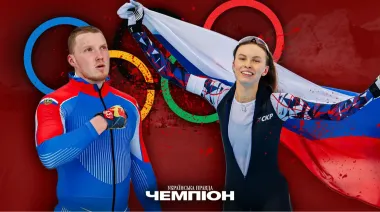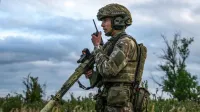Non-neutral competitors at the 2026 Olympics: 56 Russian athletes who support Putin regime

Less than three months remain before the start of the XXV Winter Olympic Games in Milan and Cortina d'Ampezzo. While the world prepares for the main sporting event of the four-year cycle, the question of whether Russian athletes should participate remains unresolved.
Despite official bans and the formal "neutrality" imposed on Russian athletes following Russia's full-scale invasion of Ukraine, many potential Olympic competitors are demonstrating a stance that is anything but neutral.
Analysts from the Molfar Intelligence Institute, supported by the International Renaissance Foundation, have compiled dossiers on 56 Russian athletes who may travel to the 2026 Olympic Games and who, despite their declared neutrality, continue to support the war against Ukraine or openly display loyalty to the Putin regime.
Presidential grants, ties to service members of the Russian National Guard (Rosgvardia) and trips to occupied Crimea – these details, along with their biographies, social media accounts and online activity, underpin a major study that again shows Russian "neutrality" in sport exists only during international competitions.
The group of athletes who have demonstrated their "neutral" stance includes representatives of: bobsleigh (26), skeleton (9), short track (6), ski mountaineering (5), speed skating (4), figure skating (4), alpine skiing (2).
According to the neutrality criteria introduced by the IOC ahead of the Paris Summer Olympics, Russian and Belarusian athletes must meet the following requirements in order to receive neutral status:
- Compete exclusively as individuals, without representing any team, club, or national federation of Russia or Belarus;
- Not publicly express or demonstrate support for Russia's war against Ukraine or for any other actions by states that violate the Olympic Charter;
- Not belong to the armed forces, security or law-enforcement structures (Ministry of Defence, FSB, Rosgvardia, Interior Ministry, or the equivalent agencies in Belarus, etc.);
- Not participate in propaganda events linked to state interests, state symbols or political statements of Russia or Belarus;
- Not have contractual, financial or organisational ties with state bodies or institutions sanctioned by the IOC or international authorities;
- Not use public or digital channels (social media, press, interviews) to promote political or nationalist messages;
- Sign the official Declaration of Neutrality, which is legally binding for the athlete and their team.
Despite the clarity of these rules, the IOC does not always ensure strict enforcement. The conduct of many "neutral" Russian athletes shows that numerous criteria are being breached, particularly through involvement in security structures, receipt of state-funded benefits or public expressions of support for Russia's war against Ukraine.
The situation surrounding Russia's "neutral" athletes is becoming increasingly worrying. Even bans imposed by international federations in sports such as luge, bobsleigh and skeleton are being challenged in court and, in some cases, overturned, potentially reopening the way for Russian athletes to return to the Olympic arena.
Meanwhile, the IOC maintains a compromise approach, refusing to impose a complete ban on athletes from Russia and Belarus despite their violations of neutrality rules, and allowing them to compete under the AIN (individual neutral athlete) designation.
Below are the 56 Russian athletes whose activities were analysed by the Molfar Intelligence Institute. Analysts examined their public statements, social media activity – accounts they follow and posts they comment on or like that endorse Russian troops or authorities – visits to Russian-occupied territories in Ukraine, participation in Kremlin-organised events, involvement in security forces and other relevant behaviours.








